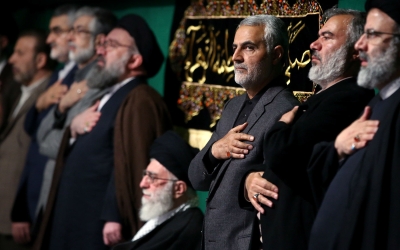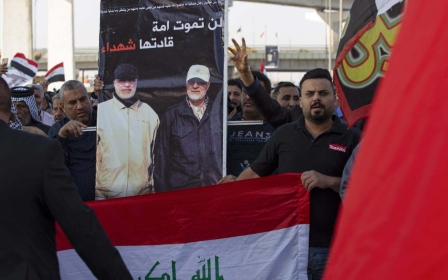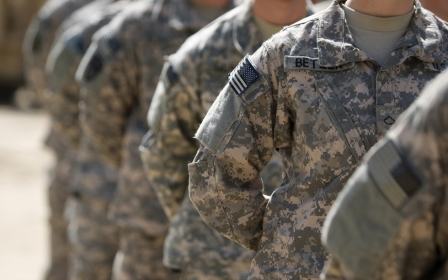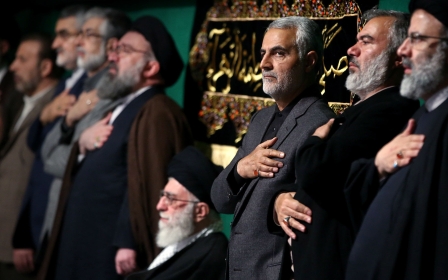Confusion in Washington as Pentagon chief denies US is leaving Iraq
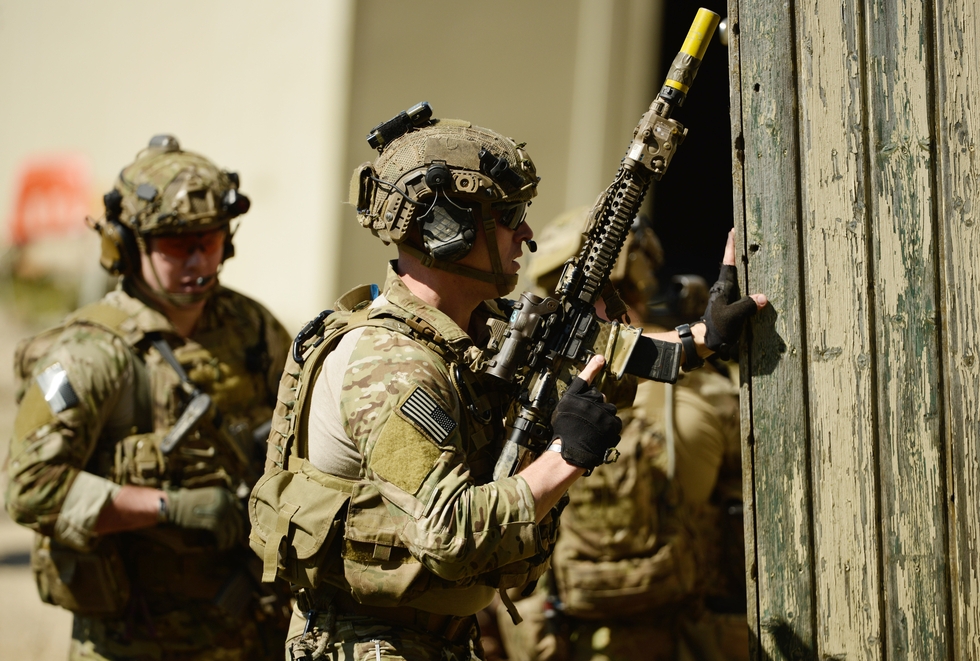
The United States has said it will reposition its forces within Iraq but denied reports that it would leave the country, less than 24 hours after the Iraqi parliament demanded their expulsion.
According to a leaked letter sent to the Iraqi military, Brigadier General William Seely, the head of the US-led coalition fighting against Islamic State (IS), said that US forces would be relocated "to prepare for onward movement" and that he respected Iraq's "sovereign decision to order our departure".
However, US Defense Secretary Mark Esper told reporters at the Pentagon that the US had not made any decision to leave Iraq.
"We are repositioning forces throughout the region ... beyond that ... that letter is inconsistent with where we are right now," Esper said.
General Mark Milley, the chairman of the Joint Chiefs of Staff, also sought to play down the letter, saying it was poorly worded and incorrectly implied withdrawal, when it was only meant to draw attention to increased troop movements.
"That letter - it was a draft, it was a mistake, it was unsigned, it should not have been released," Milley said.
"The first part of it, which says 'repositioning forces over the course of the coming days to prepare for onward movement' ... [was] poorly worded, implies withdrawal. That is not what's happening."
'A kerfuffle'
Milley said the US wanted to explain to the Iraqi military that there had been increased movement of aircraft, including transporting forces between bases in Iraq and also moving them into Iraq from Kuwait.
“It (the draft letter) was sent over to some key Iraqi military guys in order to get things coordinated for air movements, etc. Then it went from that guy’s hands to another guy’s hands and then it went to your hands. Now it’s a kerfuffle,” Milley said.
Milley said the unsigned draft document was sent around to get input from Iraqi officials, the kind of thing he said he does regularly.
“I send drafts all over Washington DC that aren’t signed to get people’s input and feedback,” Milley said.
“The long and short of it is: It’s an honest mistake by people trying to do the right things in highly dynamic situations, etc. It should not have been sent.”
Who was Qassem Soleimani?
+ Show - HideIranian Major-General Qassem Soleimani, the shadowy top commander of the Quds Force of the Revolutionary Guards, helped Iran fight proxy wars and increase its foothold across the Middle East.
His assassination in a US air strike on his convoy at Baghdad airport on 3 January marked the end of a man who was celebrated at home and closely watched by the US, Israel and Tehran's regional rival Saudi Arabia.
From working as a teenager to pay off his father’s debts to a swift rise in Tehran’s elite force, Soleimani, 62, was responsible in the end for Iran’s clandestine overseas operations and was often seen on battlefields guiding Iraqi Shia groups in the war against Islamic State.
He was born into an agricultural family in the village of Qanat-e Malek in southeast Iran in 1957. At 13, he moved to the town of Kerman to work in construction and help his father pay back loans, according to a first-person account from Soleimani posted by Defa Press, a site focused on the history of Iran’s eight-year war with Iraq.
When the revolution to oust the shah began in 1978, Soleimani was working for Kerman's municipal water department and organised demonstrations against the monarch. He volunteered for the Revolutionary Guard and, after war with Iraq broke out in 1980, quickly rose through the ranks and went on to battle drug smugglers on the border with Afghanistan.
In 1998, he became chief of the Quds Force, a post in which he helped Iran form regional alliances as it came under pressure from the US sanctions that have devastated its economy. He kept a low profile in this position while he strengthened Iran’s ties with Hezbollah in Lebanon, Syrian President Bashar al-Assad's government and militia groups in Iraq.
At the height of the civil war between Sunni and Shia militants in Iraq in 2007, the US military accused the Quds Force of supplying improvised explosive devices to Shia militants which led to the death of many American soldiers.
As the Americans struggled to stabilise the country and were looking for a broker to help, Soleimani wrote to US General David Petraeus, then commanding US forces in Iraq, in 2008.
"General Petraeus, you should know that I, Qassem Suleimani, control the policy for Iran with respect to Iraq, Lebanon, Gaza and Afghanistan," the commander reportedly wrote in a phone text.
"The ambassador in Baghdad is a Quds Force member. The individual who's going to replace him is a Quds Force member."
Soleimani was arguably even more influential in Syria. Under him, the Quds Force shored up support for Assad when he looked close to defeat in the civil war that has been raging since 2011. His visit to Moscow in the summer of 2015 was the first step in planning for a Russian military intervention that reshaped the Syrian war and forged a new Iranian-Russian alliance in support of Assad.
His activities had made him a repeated target of the US Treasury: Soleimani was sanctioned by the United States for the Quds Force's support for Lebanon's Hezbollah and other armed groups, for his role in Syria’s crackdown against protesters and his alleged involvement in a 2011 plot to assassinate Adel al-Jubeir, then the Saudi ambassador to the United States.
Soleimani’s success in advancing Iran’s agenda had put him in the crosshairs of regional foes Saudi Arabia and Israel even before the US assassination on Friday. In 2017, top Saudi intelligence officials looked into the possibility of using private companies to kill Soleimani, according to the New York Times.
He was killed along with top Iraqi militia commander Abu Mahdi al-Muhandis. Both men were seen as heroes in Iran's fight against its enemies and state television heaped them with praise after their deaths were announced. A Revolutionary Guard spokesman cried during a live broadcast.
On Sunday, Iraq's parliament passed a resolution telling the government to end the presence of all foreign troops.
It came in reaction to a US precision drone strike on Baghdad that killed Iranian general Qassem Soleimani and top Iraqi commander Abu Mahdi al-Muhandis, among others.
"The Iraqi government must work to end the presence of any foreign troops on Iraqi soil and prohibit them from using its land, airspace or water for any reason," the resolution said.
Since the killings, rival Shia political leaders have called for US troops to be expelled from Iraq in an unusual show of unity among factions that have squabbled for months.
"Despite the internal and external difficulties that we might face, it remains best for Iraq on principle and practically," Iraqi Prime Minister Adel Abdel Mahdi said.
"There is no need for the presence of American forces after defeating Daesh [Islamic State]," said Ammar al-Shibli, a Shia lawmaker and member of the parliamentary legal committee, before the parliamentary meeting.
Some 5,200 US soldiers are currently stationed across Iraqi bases to support local troops preventing a resurgence of IS.
They make up the bulk of the broader coalition, invited by the Iraqi government in 2014 to help combat the armed group.
Middle East Eye propose une couverture et une analyse indépendantes et incomparables du Moyen-Orient, de l’Afrique du Nord et d’autres régions du monde. Pour en savoir plus sur la reprise de ce contenu et les frais qui s’appliquent, veuillez remplir ce formulaire [en anglais]. Pour en savoir plus sur MEE, cliquez ici [en anglais].


